By Paula Schlueter Ross
The haunting images and heart-wrenching memories will be with him for the rest of his life, says LCMS Missionary James Neuendorf.
The missionary was part of the Synod’s six-person “assessment team” that traveled the rutted, dusty roads of Haiti for two days, seekin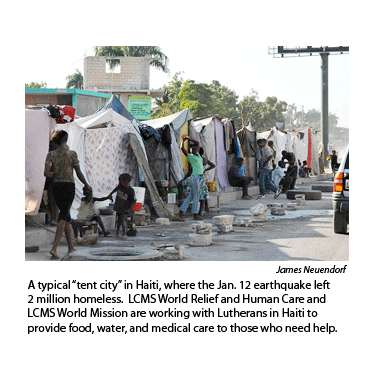 g first-hand information about the effects of the Jan. 12 earthquake and the needs of those who survived.
g first-hand information about the effects of the Jan. 12 earthquake and the needs of those who survived.
In downtown Port-au-Prince, there were blocks upon blocks of buildings, including schools, “pulverized into dust,” Neuendorf told Reporter via e-mail. There was the unmistakable stench of death, he said, mixed with the everyday smells of a desperately poor country: trash and defecation. There was the overlooked human skeleton, rotting on the sidewalk, that passersby seemed to ignore.
Outside the city, in dozens of makeshift refugee camps, there were thousands of “tents” — carefully draped blankets, boxes, and bedding, actually — that people will be calling home “for a very, very, long time,” Neuendorf said.
As the missionary walked through one of the camps, children and adults ran up to him, giving him a “thumbs up” sign.
“They knew instinctively that I was part of the effort to help them in this tough time, and instead of curiosity, the reaction … was a sigh of relief,” he recalled. “Help was here.”
There was the Lutheran church in Jacmel, where the assessment team worshiped with “people who had lost everything” and 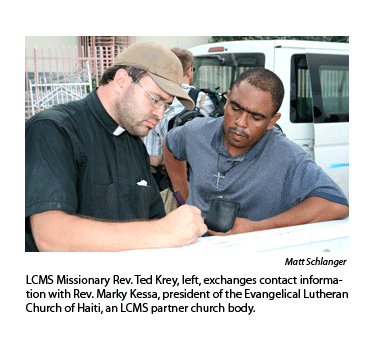 where Neuendorf said he heard “some of the most beautiful and sincere music of my life.”
where Neuendorf said he heard “some of the most beautiful and sincere music of my life.”
The missionary said he also saw relief supplies being unloaded from military and relief vehicles and aircraft. And, he heard Haiti’s Lutheran pastors express their gratitude “that we would sacrifice to be with them in this time of difficulty.”
In a video recorded by Dr. Douglas L. Rutt of the assessment team, Rev. Thomas Bernard, a pastor of the Evangelical Lutheran Church of Haiti, says some Haitians believe the earthquake means “God is very upset with Haiti because some of the people are doing things which are … against God’s Word.”
But he knows that God “is still with Haiti, and with us,” Bernard says. He and other Lutheran pastors comfort their people by “[sharing] God’s Word with them, letting them know [that] even though we are facing all these kinds of problems in Haiti, that doesn’t mean God doesn’t love us. He does love us.”
That message is being hand-carried to Haiti by The Lutheran Church–Missouri Synod, which has responded to the disaster in a number of ways:
- LCMS World Mission’s missionaries and Lutherans in the Dominican Republic, which borders Haiti, began ministering to Haitians immediately after the earthquake, providing food, water, and spiritual care to refugees who had crossed the border into Jimani, Dominican Republic.
Missionary Rev. Ted Krey, working at the Good Samaritan Hospital in Jimani, said there were 137 patients at the 60-bed facility on Jan. 16, and by the next da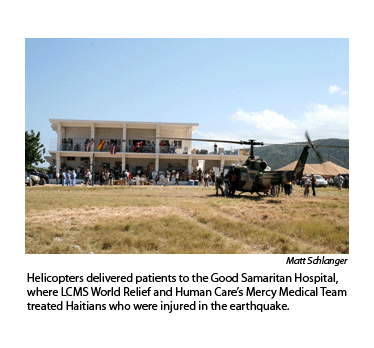 y, 500. More than 800 have received care at the hospital, he said.
y, 500. More than 800 have received care at the hospital, he said.
- LCMS World Relief and Human Care sent a 13-member Mercy Medical Team (MMT) to the hospital in Jimani Jan. 19-23. MMT physicians took turns working day and night shifts, “doing surgery around the clock,” according to Krey. Team members also assisted LCMS missionaries in providing water, rice, and beans to Haitian refugees there.
Three more Mercy Medical Teams are expected to serve in Haiti in February and March.
- The Synod’s mission board temporarily moved six missionaries from Panama and the Cayman Islands into the Dominican Republic to assist their counterparts with logistical and ministerial support for relief efforts on the Haiti border and in Haiti. Among the re-assigned missionaries is Dr. Jorge Groh, regional director for Latin America with LCMS World Mission.
- The six-member LCMS assessment team visited Port-au-Prince, Jacmel, and other parts of Haiti Jan. 22-23, accompanied by leaders of the Evang
 elical Lutheran Church of Haiti (ELCH), an LCMS partner church. The team included representatives of both LCMS World Mission and LCMS World Relief and Human Care, who are evaluating such things as needs (medical, food/nutritional, and spiritual/pastoral care) and road conditions in order to continue assistance to Haiti and plan future work there.
elical Lutheran Church of Haiti (ELCH), an LCMS partner church. The team included representatives of both LCMS World Mission and LCMS World Relief and Human Care, who are evaluating such things as needs (medical, food/nutritional, and spiritual/pastoral care) and road conditions in order to continue assistance to Haiti and plan future work there.
Team members met with ELCH President Rev. Marky Kessa and Haitian pastors to begin formulating “a comprehensive Lutheran ministry of presence and mercy,” reported Rev. Glenn Merritt, LCMS World Relief and Human Care (WR-HC) director of disaster response and leader of the assessment team.
LCMS WR-HC and LCMS World Mission are working cooperatively with the Haitian church body “to provide immediate care to as many needy as possible, as quickly as possible,” Merritt said. “Even though the governmental, military, and NGOs [non-governmental organizations] are working day and night, many needs remain unmet — needs that will be met through the local congregations of our partner church in Haiti.”
Adds Rutt: “The pastors of the ELCH are already saying that we can’t just care for the people of our church — we help all people.
“There is a real opportunity to work through this church, our Lutheran brothers and sisters in Christ, to demonstrate the love of Jesus because we are present in this time of trouble,” said Rutt, associate professor of Pastoral Ministry an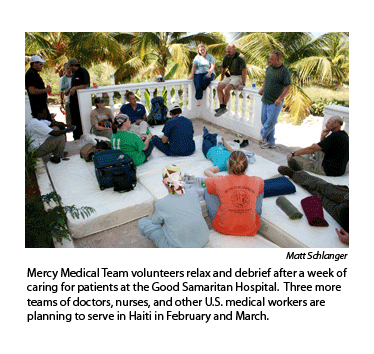 d Missions at Concordia Theological Seminary, Fort Wayne, and former area secretary for Latin America with LCMS World Mission.
d Missions at Concordia Theological Seminary, Fort Wayne, and former area secretary for Latin America with LCMS World Mission.
Groh, who also was part of the assessment team, said he was “happy to see how strong the leadership of the [Haiti] church is. I believe the ELCH is in a good position to follow through with a collaborative response.”
Although no ELCH pastors have been reported killed or injured, a few of their relatives perished in the disaster. And, it is not yet known how many ELCH members have died or been injured.
And, although no LCMS members died in the earthquake, an Evangelical Lutheran Church in America (ELCA) seminary student, Ben Larson, was killed. Larson, a student at the ELCA’s Wartburg Theological Seminary in Dubuque, Iowa, was teaching theology to Lutherans in Port-au-Prince when the earthquake struck. He was buried when the building he was in collapsed. Click here to read an ELCA News Service story about Larson.
The LCMS assessment team delivered to Kessa messages from several Latin American Lutheran church presidents, and a letter from LCMS President Dr. Gerald B. Kieschnick assuring the Haitian church leader of the Synod’s continued prayers and financial support.
Those financial contributions from U.S. Lutherans, Kieschnick wrote, “make it possible for the tangible expressions of love, care, and concern that you and your people will receive, not only from this week’s delegation, but also for many weeks and months to come.
“The ongoing support that we hope and pray will be possible for us to bring to you will be vital for the re-establishment of health and healing, both of body and of soul, following the losses experienced by the people of Haiti,” Kieschnick said in the letter, which also was e-mailed to Kessa Jan. 18.
Kieschnick had planned to accompany the assessment team to Haiti, but was advised by LCMS World Mission staff to postpone his trip until conditions had improved.
“I’m still planning to go,” he told Reporter, “at a time that my presence can be most meaningful and helpful to our brothers and sisters in Christ in the Evangelical Lutheran Church of Haiti.” 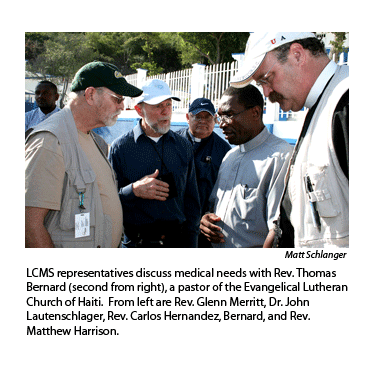
- An LCMS pastoral care team, led by LCMS WR-HC Executive Director Rev. Matthew Harrison, presented on Jan. 22 a $30,000 emergency grant to Kessa. The funds are being used by the ELCH to provide food, water, and shelter for thousands of Haitians left homeless by the earthquake.
The pastoral care team worked with the LCMS assessment team and missionaries to distribute food and water and offer comfort to Haitian refugees who fled to the Dominican Republic.
Harrison and other team members helped hand out meals and reassured refugees terrified by earthquake aftershocks in Jimani, where some 1,500 frightened Haitians had gathered outside the Good Samaritan Hospital. Earlier, inside the hospital, he prayed with patients and their families, including the parents of an injured child who had three of four limbs in casts.
“It’s a very devastating situation,” Harrison said. But the people are grateful, he noted.
In his blog, which is linked to the LCMS WR-HC Web site, Harrison writes about an emergency-room physician whose experience at the Jimani hospital had been very emotional for her.
“I just treated a woman who had her arm guillotined with nothing but Tylenol as pain reliever, and she was smiling at me, thanking me,” the doctor told Harrison. “I couldn’t believe it,” she said. “These people have lost everything, and they are so thankful.”
Long-term needs in Haiti will be extraordinary, Harrison said, for housing and medical and post-traumatic stress care.
“I pray that folks will respond generously and consistently,” he said, and that the LCMS can “be present, act, love, serve. That’s the Jesus route in time of disaster.”
Kim Plummer Krull also provided information for this story.
Posted Jan. 28, 2010

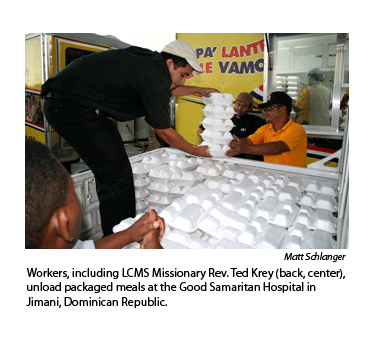 elical Lutheran Church of Haiti (ELCH), an LCMS partner church. The team included representatives of both LCMS World Mission and LCMS World Relief and Human Care, who are evaluating such things as needs (medical, food/nutritional, and spiritual/pastoral care) and road conditions in order to continue assistance to Haiti and plan future work there.
elical Lutheran Church of Haiti (ELCH), an LCMS partner church. The team included representatives of both LCMS World Mission and LCMS World Relief and Human Care, who are evaluating such things as needs (medical, food/nutritional, and spiritual/pastoral care) and road conditions in order to continue assistance to Haiti and plan future work there.

